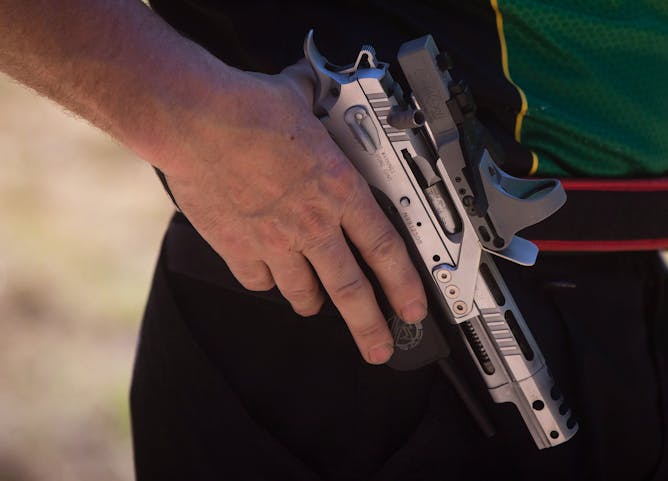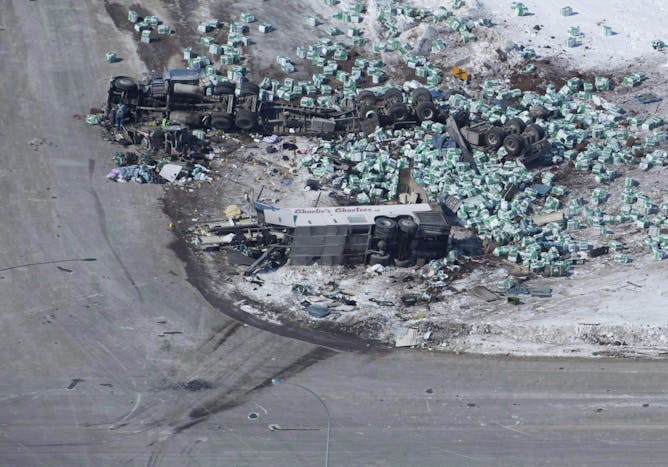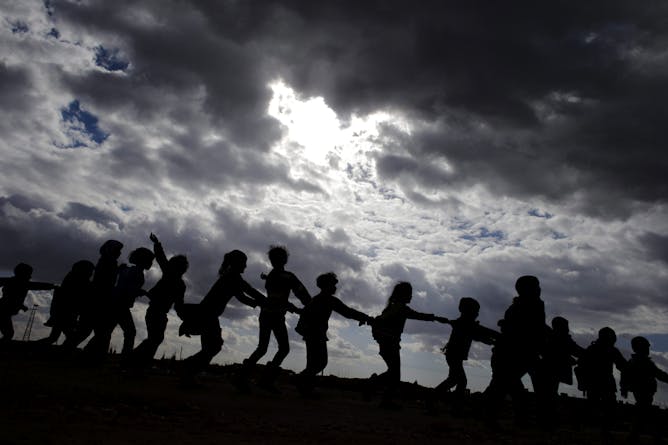|
When a gunman walked down one of Toronto’s main streets last month and fired indiscriminately into crowded restaurants and cafés, the city’s mayor quickly suggested there should be a ban on hand guns in Toronto. Since then, there’s been a debate about whether hand guns should be banned right across Canada. Today in The Conversation Canada, R. Blake Brown of Saint Mary’s University looks at the history of how Canada has regulated the sale of pistols over the years – a fascinating read that helps put the current debate in proper context.
We’re also looking back at another recent Canadian tragedy: the horrific truck-bus crash last spring that killed 16 members of the Humboldt Broncos hockey team. Alexander Crizzle of the University of Saskatchewan has researched the health of truck drivers and his insights should offer some advice for policy makers.
That Fitbit on your wrist or your iPhone fitness app can help you be healthy – but as Lisa Carver of Queen’s University reports, the data collected by these wearable technology devices could someday produce a “wellness report” similar to personal credit reports. Do we really want that?
And finally… Nadia Naffi of Concordia University looks at the ongoing Syrian refugee crisis and how, even in a country like Canada that has welcomed thousands of refugees, challenges like labour-market discrimination, residential segregation, xenophobia and racism still exist.
Regards,
|

Far from a knee-jerk reaction to Toronto’s recent mass shooting, fresh calls for tougher gun control laws have a long history in Canada. A man places his hand on his handgun in B.C. in 2014 during the International Practical Shooting Confederation Canada national championships.
THE CANADIAN PRESS/Darryl Dyck
R. Blake Brown, Saint Mary’s University
Calls to outlaw handguns in Canada are hardly knee-jerk proposals in response to violent incidents. Instead, they're in line with the historic Canadian trend to limit the presence of modern pistols.
|

The wreckage of the fatal Humboldt Broncos bus crash outside of Tisdale, Sask., is seen on April, 7, 2018.
THE CANADIAN PRESS/Jonathan Hayward
Alexander Crizzle, University of Saskatchewan
Truck drivers in Canada are exposed to many health risks. The horrific Humboldt bus crash should be a wake-up call for new regulations and wellness programs within the industry.
|

The data being stored by your smartphone could be used to determine your health risk, and it might be wrong.
(Shutterstock)
Lisa F. Carver, Queen's University, Ontario
Financial institutions and stores judge our credit-worthiness based on how we handle our money. But we should be cautious of letting others compile our health data into a "wellness report."
|

Of Syria’s estimated 10 million children, nearly 6 million are displaced or living as refugees: Here, some play in the village of Jibreen south of Aleppo in Dec. 2016. To help with the rebuilding of Syria, we need to curb the rising tide of xenophobia online.
AP Photo/Hassan Ammar
Nadia Naffi, Concordia University
One of the World Bank's mandates is to prepare for the physical and human capital reconstructions of post-conflict Syria. However, an image reconstruction of Syrians and of Syrian refugees is also needed
|
Culture + Society
|
-
Michelle Duster, Columbia College Chicago
My great-grandmother, an early civil rights champion, path-breaking journalist and suffrage leader, was among the most influential women of her time.
|
|
Environment + Energy
|
-
Manimaran Govindarasu, Iowa State University; Adam Hahn, Washington State University
Power utilities' cybersecurity practices may be effective, but need to evolve over time. And all companies operating elements of the grid – even the small ones – should step up.
|
|
Science + Technology
|
-
Eve MacDonald, Cardiff University
Without the scientific knowledge we have today, ancient cultures turned to myths and legends to understand celestial objects.
|
|